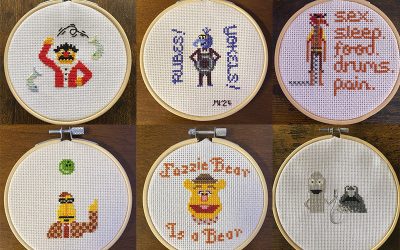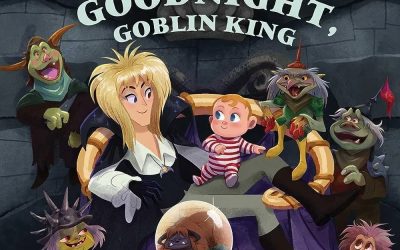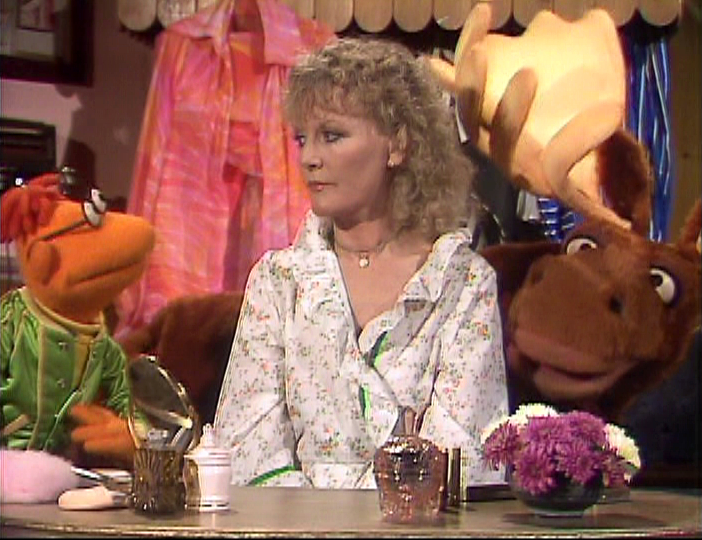 Original Air Date: May 5, 1978
Original Air Date: May 5, 1978
Normally, watching an episode of The Muppet Show leaves me with joy, contentment, and in some rare instances, a bit of introspection. But this episode leaves me with a whole bunch of questions, and not the fun questions like “whatever happened to the Sam the Eagle editorials?” or “just what the heck is the banana sketch?” I genuinely wonder about the thought process that brought some of these bits into existence. This may very well be one of the most inexplicable episodes of The Muppet Show.
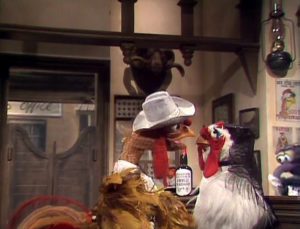 The first hit on our “what” parade is the poultry western. Thankfully, there is a bit of an explanation for this sketch: as The Muppet Show was starting to gain international popularity, writer Joseph A. Bailey pitched this as a sketch that wouldn’t be held up by the language barrier. Thus, there’s no dialogue beyond clucking.
The first hit on our “what” parade is the poultry western. Thankfully, there is a bit of an explanation for this sketch: as The Muppet Show was starting to gain international popularity, writer Joseph A. Bailey pitched this as a sketch that wouldn’t be held up by the language barrier. Thus, there’s no dialogue beyond clucking.
But there are still some choices that I don’t quite understand. Why is Gonzo tending bar? Is it because of his love of chickens? It’s not like Gonzo says anything, so it could’ve easily just been another chicken or rooster, and nothing would’ve changed. If you have Gonzo in a sketch, why are you just making him a background character? Was it to make non-English speakers feel like a sketch aimed at them is just as important as a sketch with dialogue by having a main character appear? But more importantly, why does the sheriff rooster look like one of the roosters in the wanted posters behind the bar? What is he hiding? What did he do? Will someone warn the chickens before it’s too late? Will Gonzo do it?
Okay, calming down and moving on. Focusing on a number featuring this week’s guest star, Petula Clark, the Muppets show their seductive side in “The Boy from Ipanema.” Like, things get sultry, and not with the usual overtone of silliness that pervades most Muppet Show numbers like this. There is some serious sexual chemistry between Clark and the Bossman. That Bossman’s voice gets real soft and flirtatious when he’s talking with Clark.
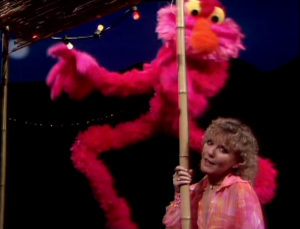 Obviously, when you pick bits for the guest star to do, you try to aim for their strengths, and with Clark being a singer and actress, a musical number with some dance work makes sense. And “The Boy from Ipanema” is a good choice, but just why did they go so sensual with it? And for that matter, why does Clark sing two songs (she later sings “Too Shy to Say” with Rowlf on piano) about unrequited attraction? Is everything alright with her? Does she want someone to talk to? Is she willing to be so open and vulnerable with the Bossman? And will the Bossman accept her for who she is?
Obviously, when you pick bits for the guest star to do, you try to aim for their strengths, and with Clark being a singer and actress, a musical number with some dance work makes sense. And “The Boy from Ipanema” is a good choice, but just why did they go so sensual with it? And for that matter, why does Clark sing two songs (she later sings “Too Shy to Say” with Rowlf on piano) about unrequited attraction? Is everything alright with her? Does she want someone to talk to? Is she willing to be so open and vulnerable with the Bossman? And will the Bossman accept her for who she is?
I…think I’m letting this review get away from me. Okay, let’s wrap up with the most inexplicable bit in this show: Mickey Moose, and to a lesser extent, Ronald Duck. Once Mickey reveals his name, Kermit seems to fly into a rage any time the moose appears. And why? Because Mickey Moose is a terrible pun? We all know that, but Kermit’s put up with worse. Remember Fozzie’s delivery jokes in the Candice Bergen episode? Kermit gets peeved, but he doesn’t chase Fozzie out of the theater.
But something about Mickey Moose just incenses Kermit. What could upset him so? Did Mickey Mouse infuriate him at some point (and if so, when did they reconcile, as Kermit and Mickey are on good terms at the end of The Muppets at Walt Disney World)? Has Kermit finally reached his pun-related breaking point? Is he just as confused as I am as to why a Mickey Mouse-inspired moose sounds like John Wayne? Did Jerry Nelson decidedly decide to go in the opposite direction in relation to the vocal range of Mickey Mouse? And why does Ronald Duck have an English accent? And how does Mickey manage to break the set for the final number when he’s already been shooed out of the theater? Did he break back in? What vendetta does the moose have against Kermit? WHY WILL NO ONE ANSWER MY QUESTIONS?
Y’know, I think I’ll just end it here. Some things are better left unanswered.
Best Joke: (From the “At the Dance” sketch) Woodpecker: “I’d like to take you home to mother.” Pink Bird: “Really, Harold?” Woodpecker: “Yeah, maybe she could teach you how to dance.” It’s such an unexpected punchline, and I love it.
Worst Joke: Waldorf: “Well, that song brings back memories.” Statler: “What memories?” Waldorf: “I forgot.” They’ve done similar jokes. I guess they forgot about that, too.
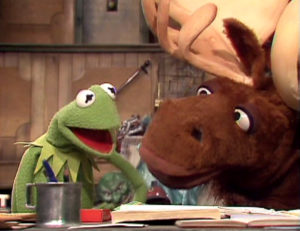 MVM (Most Valuable Muppet): Though this may outrage a certain frog, I think I have to pick Mickey Moose. It’s a dumb joke, but it is memorable.
MVM (Most Valuable Muppet): Though this may outrage a certain frog, I think I have to pick Mickey Moose. It’s a dumb joke, but it is memorable.
Most Classic Moment: This week’s UK Spot, “Upidee.” The song has been featured on several compilation albums, and it gave us the classic lines “My bellybutton left the room” and “Underwear with ham on rye.”
Should-Be-Classic Moment: The look on Clark’s face at the end of the cold open. She is not having this joke, and she doesn’t care who knows.
Coolest Puppetry Effect: Everyone sinking into the table in “Veterinarian’s Hospital.” It’s a simple effect, but it works so well.
Musical Hightlight: Much like “Two Lost Souls” in the John Cleese episode brought back memories of performing in Damn Yankees in high school, the finale in this episode, “Tomorrow,” brings back memories of playing Daddy Warbucks in my middle school production of Annie. It was the highest I’ve ever been billed. Geez, I peaked in middle school…
Okay, One More Thing: Clark seems pretty close with Mickey during the goodnights. What will she tell the Bossman?
Click here to joke that Mickey Mouse now owns Mickey Moose on the ToughPigs forum!
by Matthew Soberman


